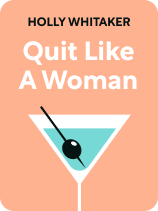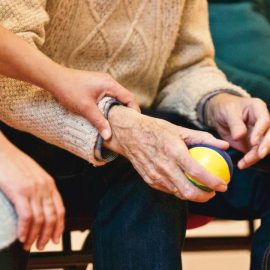

This article is an excerpt from the Shortform book guide to "Quit Like a Woman" by Holly Whitaker. Shortform has the world's best summaries and analyses of books you should be reading.
Like this article? Sign up for a free trial here.
What causes alcoholism? Is alcoholism psychological or genetic?
Many people assume that alcoholism is a biological disease, but that’s simply not the case. As Holly Whitaker’s book Quit Like a Woman suggests, alcoholism can also stem from psychological factors such as trauma and mental health issues.
Keep reading to learn what causes alcoholism and the first step to treating it.
The Real Cause of Alcoholism: Inner Wounds
Let’s look at what causes alcoholism more often than the generally assumed genetic basis for addictive behavior. While some people do have a biological predisposition to addiction, addiction is also a symptom of inner suffering that can arise in response to the challenges of existing in a patriarchal, capitalist society.
Whitaker explains that when you’ve suffered trauma, had a difficult upbringing, are societally oppressed or marginalized, have mental health issues, don’t have a strong support network, or suffer from other inner pain, you’re more likely to turn to outside sources—drugs, alcohol, shopping, and so on—for the comfort and validation you can’t give yourself. For instance, you might eat excessively to make yourself feel better about a bad test grade you know your parents will punish you for, or you might drink to numb the pain of a workplace microaggression.
When you repeatedly use an outside substance to cope with inner pain, you reinforce a neurological cycle of addiction to that substance, continues Whitaker: Outside sources of pleasure trigger the release of dopamine, the happiness hormone. Then, the substance triggers the subsequent release of glutamate, which makes you remember how happy the addictive substance made you feel so you’ll want to take it again. When this cycle repeats for long enough, you come to believe the pleasurable substance is not only enjoyable but necessary for survival, and you prioritize it over true survival needs, like finding nourishment, procreating, and defending yourself. You thus become addicted, concludes Whitaker.
(Shortform note: The neurological process Whitaker describes may become even more destructive and worsen your addiction if you have reward deficiency syndrome (RDS). When you have RDS, you have fewer dopamine receptors than other people. This means you don’t get the same level of pleasure as others from the same thing—for instance, a piece of cake—and must consume more of the substance to get a significant hit of pleasure—say, an entire cake. Your brain then still releases glutamate to make you remember how pleasurable the entire cake was. You thus become addicted but need a particularly high quantity of the substance to feel pleasure, which will likely have adverse health effects.)
Additional Factors Contributing to Alcohol Addiction
Whitaker focuses on the psychological pain that can set the scene for alcohol addiction while acknowledging that other factors contribute to an addiction—such as the above-mentioned genetic predisposition. Let’s look at some of those other factors: One is the school and peers a person grew up around. If a teen spends time with other teens who drink, they’re more likely to drink. Teens with social difficulties may also view alcohol as a way to socialize more easily and therefore drink more.
Similarly, if someone started drinking at an early age because parents or older siblings made alcohol easily accessible, that person is more likely to develop alcohol problems later in life.
The above two factors occur early in life, yet factors that push someone toward alcohol can also crop up in adulthood. Work and money troubles can turn alcohol into an escape for adults. Even having a stable yet stressful job can increase the likelihood that someone drinks to unwind or destress. As Whitaker asserts, addiction is a complex condition with many possible causes that vary between people.
The Solution: Heal Your Inner Wounds to Recover From Your Addiction
Because of how addiction starts, we shouldn’t focus on treating the addiction itself, but rather on healing the inner wounds that give rise to the addiction, claims Whitaker.
(Shortform note: Treating a root cause, rather than symptoms, is an approach applied not only to psychology but also to problem-solving in business. The “Five Whys” technique—in which you repeatedly ask “why” a problem occurs until you get to the root of the problem—is a way to move past symptoms to their cause and could be applied to the process of uncovering the wounds that gave rise to your addiction.)

———End of Preview———
Like what you just read? Read the rest of the world's best book summary and analysis of Holly Whitaker's "Quit Like a Woman" at Shortform.
Here's what you'll find in our full Quit Like a Woman summary:
- Why society misunderstands what alcohol addiction is, what causes it, and how to treat it
- Why alcohol is always bad for you, even in moderation
- A feminine, holistic approach to recovery and sobriety






